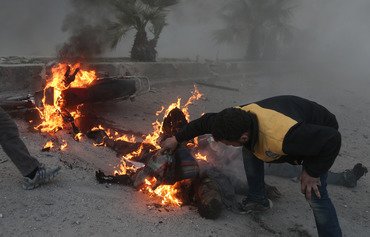A first aid convoy reached Eastern Ghouta on Monday (March 5th), but the operation was cut short as airstrikes pounded the enclave, killing at least 68 civilians, according to the Syrian Observatory for Human Rights.
Fresh airstrikes and clashes shook the opposition enclave on Tuesday after desperately needed aid deliveries to tens of thousands of besieged civilians were cut short by fighting.
At least nine civilians were killed in airstrikes on the town of Jisreen early Tuesday, the Observatory said, while in the main town of Douma, airstrikes had reduced homes to piles of rubble on both sides of the road.
Regime troops have advanced rapidly across farmland in Eastern Ghouta in the past week, and as of early Tuesday controlled 40% of the enclave, the Observatory said.
![Vehicles carrying UN and World Food Programme staff escort a 46-vehicle medical and food aid convoy as it heads to Eastern Ghouta on Monday (March 5th). [Photo courtesy of World Food Programme]](/cnmi_di/images/2018/03/06/11743-Ghouta-convoy-escort-600_384.jpg)
Vehicles carrying UN and World Food Programme staff escort a 46-vehicle medical and food aid convoy as it heads to Eastern Ghouta on Monday (March 5th). [Photo courtesy of World Food Programme]
Forty-six aid trucks entered Eastern Ghouta on Monday for the first time since the offensive started on February 18th, but had to cut short their deliveries and leave due to heavy bombardment.
"The people we have met here have been through unimaginable things. They looked exhausted," Pawel Krzysiek of the International Committee of the Red Cross (ICRC) said afterwards.
"And the aid we have delivered today is by no means enough," he said.
Aid delivery postponed
The delivery of medical and food supplies was supposed to take place on Sunday, but it had been postponed for one day "due to disagreements between the warring parties over some of the terms of the operation", local relief activist Bahaa al-Sahli told Diyaruna.
These included the regime’s refusal to allow the entry of some medical supplies, particularly surgical kits, dialysis machines and some medicines such as insulin.
"The prohibition of these items appeared to be an attempt by the regime to pressure residents to leave Eastern Ghouta for treatment," al-Sahli said.
The convoy arrived at al-Wafideen crossing on Monday morning and began entering the Eastern Ghouta region at noon in the direction of Douma, he said.
It was escorted by representatives of the World Health Organisation (WHO), World Food Programme (WFP), the Syrian Red Crescent and the ICRC.
UN Security Council to discuss crisis
The aid that was able to be delivered will be at the disposal of reliable relief organisations operating in the Douma area, who will re-sort and redistribute it and attempt to stretch it out for as long as possible, al-Sahli said.
According to the WHO, the full amount -- had delivery been completed -- would have had to suffice for 27,500 people for about two weeks. About 400,000 civilians are currently trapped in Eastern Ghouta.
France and Britain on Tuesday requested an emergency meeting of the UN Security Council to discuss the failure of the 30-day ceasefire to take hold in Syria, diplomats said.
The council is expected to meet on Wednesday to discuss the airstrikes and clashes in Eastern Ghouta that have continued despite a ceasefire demanded by the top UN body 10 days ago.

![Trucks loaded with aid gather at al-Wafideen crossing in preparation to enter Eastern Ghouta. The convoy entered the enclave on Monday (March 5th) but had to turn back without completing its delivery amid renewed bombardment. [Photo courtesy of World Food Programme]](/cnmi_di/images/2018/03/06/11742-Ghouta-relief-convoy-600_384.jpg)




